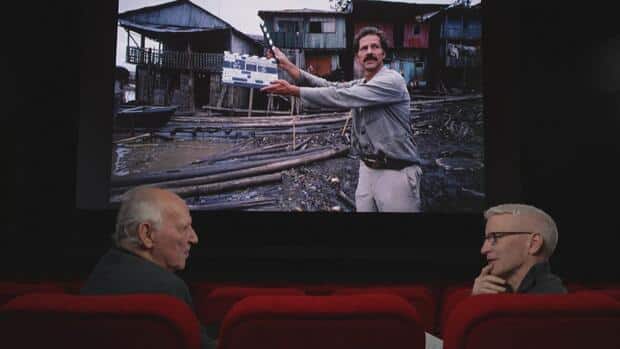Werner Herzog is not a household name, but he’s one of the most acclaimed and unique filmmakers today. In the past six decades, the German director made over 70 documentaries and features films, including a film about a New Orleans cop who was unhinged, or Grizzly Bears that ate a man. Werner Herzog is not afraid of the extreme. In fact, he’s drawn to it. In his movies, he explores the fragility of mankind, the power of nature and the edge of sanity in a dreamlike manner. He is still creating movies that no one could or would ever imagine.
In 1972, Werner Herzog was introduced to the world through “Aguirre: The Wrath Of God,” a film about conquistadors who are searching in the Amazon for a lost gold city, and gradually become insane.
Herzog’s will and determination were the only things that kept it going.
Anderson Cooper: I read you sold your shoes to buy some fish for the crew.
Werner Herzog : It’s not what directors do normally. You can trade your boots for some fish or the wristwatch I’d give away. I’d give everything away.
Anderson Cooper: Is it worth it?
Werner Herzog: Of course. It’s definitely worth it (laugh). I’m able to get away with it. I’m making a movie.
Anderson Cooper: But that’s not the loot. You’re talking about earning millions and millions of dollar. You’re talking about the loot.
Werner Herzog: Yeah. Of course, I sometimes make money and I invest it into the next film.
You may have seen “Grizzly Man”, one of Herzog’s most commercially successful documentaries. The film tells the story of Timothy Treadwell, an eccentric drifter that spent 13 summers recording himself in Alaska’s wilds interacting with grizzlys.
Treadwell appeared to believe he was their protector and had a connection with them. He was the one that needed to be protected in the end.
Herzog and I sat with others to watch the movie at the Academy Museum of Motion Pictures David Geffen Theatre in Los Angeles.
Anderson Cooper: Your view of nature is distinctly unromantic.
Werner Herzog: Yes. Nature is- — is utterly indifferent. We’re not meant to become — brothers with bears. This is something that happens only in Walt Disney and not in real life.
Herzog’s documentaries and feature films are full of remarkable moments as well as some nightmarish ones.
His curiosity has led him to remote regions of the planet. He narrates himself his documentaries in a distinctly Germanic tone. He asks difficult questions with no easy answers.
Herzog’s films have revealed the hidden landscapes beneath the Antarctic ice sheets, as well as the apocalyptic fires that raged in Kuwait following the first Gulf War. He has risked his own life to capture the power and beauty of volcanoes.
Herzog and his editor Marco Capaldo are now working together on a new document in Los Angeles.
Werner Herzog: And now music.
Anderson Cooper: Wow.
Werner Herzog: Schubert’s…
The movie is about the hunt for a legendarily large herd of African elephants. Herzog insists that it is not a film about wildlife.
Werner Herzog’s fantasy is about elephants. Perhaps a search for Moby Dick, or the white whale. It’s the dream of an Elephant.
Herzog has never received any formal training in the field of filmmaking. In 1942, Herzog was born just two weeks prior to the Allied bombing of Munich. Werner’s mother and older brother fled to the Bavarian mountains with Werner when his father was in the German military.
Werner Herzog: I grew up with complete poverty. We had no running water or sewage system. There was hardly any electricity. We only had one loaf per week. We were grabbing at her skirt and wailing about being hungry. She spins and looks at us, saying, “Boys if I had the ability to cut this out of my stomach, I would, but I cannot.”
Anderson Cooper: That experience is still fresh in my mind.
Werner Herzog: To– yes.
Anderson Cooper: –shapes you?
Werner Herzog: Yes, it does.
Herzog’s first film was not until the age of 11. He became obsessed with American B-movies like Zorro, and decided that filmmaking would be his destiny. He only needed a camera. In a Munich film school, he finally found one.
Werner Herzog : I once saw a camera room with no one in it. I went and took a camera and tested it. I walked away. They never noticed the camera missing.
Anderson Cooper: That’s a camera that was stolen.
Werner Herzog (sighing) It was more like expropriation than theft. You need to possess a certain amount, or should I say good criminal energy. (laughter)–
Anderson Cooper: Make a movie —
Werner Herzog : Yes, sometimes you do have to. You have to step outside the box.
His whole life, he has been doing things that are not the norm. In 1979, he started working on “Fitzcarraldo,” a movie based on his feverish dream. The film took three long and grueling year to complete. The German actor Klaus Kinski portrays an Irishman obsessed with building an opera house in Amazon.
Fitzcarraldo devises a scheme to raise money by harvesting rubber trees in an isolated jungle. He hires local laborers to help him haul the ship up a mountain. Herzog was not willing to take shortcuts. He bought a 340 ton steamship, and moved it up the mountain.
Anderson Cooper: Why not use special effects to move a model ship over a mountain instead of moving the actual ship?
Werner Herzog : Yes, that was it
Anderson Cooper: –an enormous–
Werner Herzog – A conversation with 20th Century Fox They said we could shoot in the San Diego botanic gardens. We could also move a miniature boat. I replied, “No. We don’t speak the same language.”
Anderson Cooper: It would have been much easier.
Werner Herzog: No. It would have made a terrible film.
It was not the worst of it. Herzog was forced to relocate the production 1,000 miles away due to a border war. Money problems, plane crashes and fighting between indigenous groups were all part of the story. Herzog’s unwavering pursuit of his vision was hard on both the crew and cast, as well as on himself. The chaos behind the scene was captured by documentary filmmakers and made into “Burden of Dreams,” a film all of its own. The movie has just been rereleased.
Werner Herzog, in “Burden of Dreams”: We challenge nature itself. It hits back. That’s it. There’s nothing grandiose. And we must accept that she is stronger than us. There is certainly a lot misery all around us. Both the trees and birds here are suffering. They don’t sing. I think they screech out of pain.
Anderson Cooper: Do you feel this every day?
Werner Herzog : Everyday, everynight, the next day and the night after that.
Herzog had to also deal with Klaus Kinski who was the star of his film and prone to rage explosions.
Werner Herzog : I had a character that was a psychopath
Anderson Cooper: he had a temper.
Werner Herzog – As insane as it gets
Werner Herzog, you had to contain him. I made his mania, his destructiveness and explosiveness into a screen.
Anderson Cooper: What is your secret?
Werner Herzog says: “Every gray hair on my body I call Kinski.” (laugh)
Kinski was in five Herzog films and died in 1991. But not before writing down his thoughts on Herzog.
Anderson Cooper: Klaus Kinski wrote in his autobiography that he had never met anyone so dull, humorless and uptight. Herzog is a miserable and hateful man, who is malevolent, greedy, nasty, treacherous and cowardly.
Werner Herzog: I helped him to make it.
Anderson Cooper: I helped him to write this.
Werner Herzog: Yeah, with Thesaurus —
Herzog was awarded the Cannes Film Festival’s Best Director Award in 1982 for “Fitzcarraldo”.
Anderson Cooper: I think you must be deluded or insane to have made this.
Werner Herzog: No, no, no. When you look at the movie industry, it is full of illusions, dementia and ego. When I look at it, I realize that I am the only clinically sane person.
Anderson Cooper: You’re the only sane person in this room.
Werner Herzog’s film shows that, yes. It’s my proof.
Herzog still has his journals that he wrote during the making of “Fitzcarraldo.” As the pressure increased, Herzog’s writing became unreadable.
Werner Herzog : It becomes almost microscopic.
He then turned these journals into a “Conquest of the Useless” book. Eleven other books have been published by him, including fiction, poetry and autobiography.
Werner Herzog: Since more than 40 years, I have always believed that my writings, prose and poetry will outlive the films.
Anderson Cooper: Do you think that your writings will outlive the films?
Werner Herzog : I am absolutely convinced.
Herzog is not a one-man show. He does occasionally act. He’s in “Star Wars: The Mandalorian.” He has also provided his distinct voice for several characters in “The Simpsons.”
In September, we were with Herzog on the Spanish Island of La Palma near the West Coast of Africa as he instructed aspiring filmmakers. The island is covered with volcanic rock and ash, the result of an eruption that occurred three years ago. It’s a Herzogian-like landscape.
This 11-day workshop is less about filmmaking fundamentals and more about poetic vision.
Werner Herzog’s fantasies. He’s looking for his ghosts.
He calls it “a film school for criminals”.
Werner Herzog : And for the rogues. You are also able-bodied, I say. Earn money for your first film. Earn money, but not by doing clerical work in an office. Work as a bouncer at a sexclub. Work as a guard in a lunatic hospital. Learn how to milk cows at a ranch. You can earn money in the real world by doing this.
It is not necessary to attend college in order to become a poet. I also teach them how to fake a permit for shooting. You see. It should look authentic.
Anderson Cooper: Fake a f— a shooting license
Werner Herzog: A shooting permit during a dictatorship.
Anderson Cooper: Did you make those?
Werner Herzog, yes of course. (Laugh) I also teach lock picking. You must know–yes, you need to be good at it.
Anderson Cooper: Wait a minute. You have to be able to fudge a permit to make a movie?
Werner Herzog: Yeah. You better always carry bolt cutters. (Laugh) This is not for the weak-hearted.
Michael H. Gavshon is the producer. Nadim Roberts, Grace Conley and Grace Conley are associate producers. Daniel J. Glucksman edited the film.










